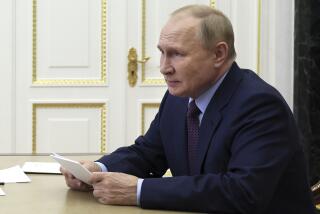Obama begins getting daily CIA briefing on economic crisis
- Share via
WASHINGTON — President Obama and senior administration officials have begun receiving a daily CIA report on the global economic crisis in addition to briefings on terrorist threats and other national security issues, CIA Director Leon E. Panetta said Wednesday.
The CIA’s role in producing the report underscores the level of anxiety within the administration over how rapidly the economic downturn is spreading, as well as its potential to hobble foreign governments and trigger instability overseas.
The report, called the Economic Intelligence Brief, was launched at the request of the White House and delivered for the first time Wednesday.
Panetta said the document would survey major economic developments internationally and focus on how plunging markets and credit pressures are driving the decisions in nations including Russia and China.
The report covers “economic, political, leadership developments” in other countries as well as “the implications of those developments in terms of the U.S. economy,” Panetta said.
Panetta’s comments came during his first extended meeting with reporters since he was sworn in as CIA director last week. The former California congressman who served as chief of staff in the Clinton White House also touched on a wide array of national security issues.
He met this week with senior Pakistani military and intelligence officials in Washington and said he had expressed concern over Pakistan’s recent decision to strike a truce with militants who have fought with the government over control of the Swat Valley region 100 miles northwest of Islamabad, the Pakistani capital.
Panetta said he pressed the Pakistanis over U.S. worries that the truce “represents a retreat in the war on terror.” Pakistani officials defended the deal, he said, as a measure that would help stabilize the region and allow the government to continue pursuing Al Qaeda and Taliban elements along the Afghan border.
The truce grants militants new powers to impose Islamic law in the Swat Valley. It follows previous cease-fires between Pakistan and militants that were widely blamed for allowing Al Qaeda to regroup and regain its strength.
Asked whether he believed the new truce would avoid that outcome, Panetta said, “I remain skeptical.”
Panetta met at CIA headquarters with Pakistani army chief Gen. Ashfaq Kayani, as well as Ahmed Shuja Pasha, the head of Pakistan’s spy service, Inter-Services Intelligence.
The two officials are part of a larger delegation meeting with senior Obama administration officials in Washington this week. Pakistan’s uneasy relationship with the CIA has been a focus of the talks.
Pakistan’s foreign minister, Shah Mehmood Qureshi, said he had asked the United States to provide unmanned aircraft that his government could use to strike extremists along the border, according to an interview published by the Associated Press.
The proposal reflects growing discomfort in Pakistan with the escalated campaign of missile strikes by CIA drone aircraft. Qureshi said he believed Pakistan should have control over such operations within its borders.
But the U.S. is unlikely to cede operational control over one of its most potent weapons against Al Qaeda’s leadership. At the meeting with reporters, Panetta declined to discuss the matter and said he was not aware of the Pakistani request.
Panetta cited other international concerns, including rampant drug violence in Mexico as well as deteriorating conditions in Somalia, Yemen and other countries seen as potential havens for Al Qaeda.
The “relationship between Somalis here and Somalia raises real concerns about the potential for terrorist activity,” Panetta said, referring to the large Somali population in Minneapolis-St. Paul. A recent case in which a Minnesota resident returned to Somalia and became a suicide bomber has raised alarm among U.S. counter-terrorism officials.
Panetta also aimed criticism at his predecessors, saying they failed to set clear boundaries for the CIA that were consistent with American values and the Constitution.
“There was a deliberate effort not to develop firm ground rules, to be able to do things in a haphazard manner,” Panetta said, adding that he believes the agency does not need so-called enhanced interrogation methods or other harsh measures to get intelligence from terrorism suspects.
His disclosure of the new CIA report on the economy reflects an expanded focus on economic issues across the U.S. intelligence community.
Director of National Intelligence Dennis C. Blair testified on Capitol Hill on Wednesday that economic instability “can loosen the fragile hold that many developing countries have on law and order.”
Already, Blair said, several European governments have been destabilized by economic distress and “much of Eurasia, Latin America and sub-Saharan Africa lack sufficient cash reserves and access to international aid.”
--
More to Read
Sign up for Essential California
The most important California stories and recommendations in your inbox every morning.
You may occasionally receive promotional content from the Los Angeles Times.










